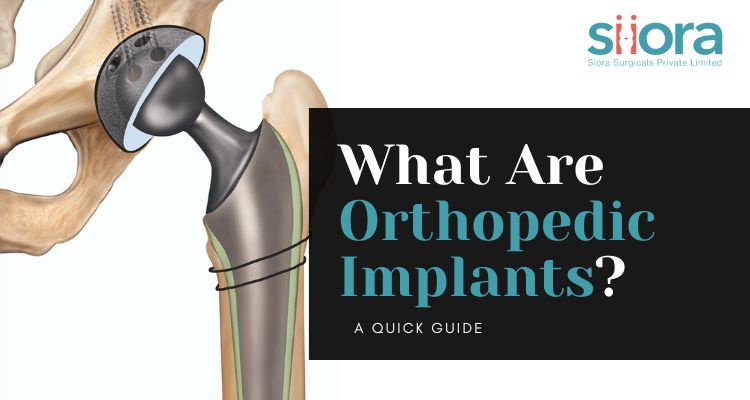Our bones and joints are the foundation of our movement. When they are injured or worn down by disease, it can significantly impact our daily lives. Thankfully, the field of orthopaedics offers a range of solutions, and one of the most important advancements is the use of orthopaedic implants.
What are Orthopaedic Implants?
Orthopaedic implants are medical devices surgically implanted to treat various musculoskeletal conditions. They are used for fixing damaged bones, joints, and cartilage. Besides this, trauma implants also provide support and stability during healing. Here are the key roles of implants:
Restoring mobility and function: Orthopedic implants allow patients to regain mobility and perform routine activities like before.
Promoting bone healing: Implants can hold fractured bones in proper alignment, facilitating a faster and more efficient healing process.
Alleviating pain: Implants can significantly reduce pain caused by damaged joints or bones, improving a patient's quality of life.
Correcting deformities: Orthopaedic implants can help correct bone deformities, resulting in better alignment and function.
What Are the Types of Orthopaedic Implants?
The world of orthopaedic implants is vast and ever-evolving. Some of the common types of trauma implants include:
Joint Replacements: These implants replace worn-out or damaged joints, most commonly in the hip, knee, and shoulder. They are typically made of durable materials like titanium alloys and high-wear-resistant plastics, mimicking the natural movement of the joint.
Fracture Fixation Devices: These implants help stabilize fractured bones during healing. They come in various forms, including LCP locking compression plates, screws, nails, wires, and rods, chosen based on the location and type of fracture.
Spine Implants: Implants are used for spinal conditions like disc herniation or spinal stenosis. These might include spinal fusion devices that promote bone growth between vertebrae or rods and screws for added stability.
Ligament and Tendon Repair Devices: These implants, such as anchors and screws, help reattach torn ligaments or tendons to bone, promoting proper healing and restoring joint stability.
What Materials Are Used in Orthopaedic Implants?
The success of an implant depends heavily on the materials used. Common materials include:
Titanium Alloys: These are lightweight, strong, and biocompatible, meaning they are well-tolerated by the body.
Stainless Steel: Another strong and durable option, though it may not be suitable for all patients due to potential allergy concerns.
Biodegradable Metals: These newer implants are made from materials that dissolve in the body over time as the bone heals. This eliminates the requirement for a repeat surgery for implant removal.
High-Density Polyethylene (HDPE): This plastic material is used to create liners for joint replacements, offering a smooth, low-friction surface that mimics cartilage.
Bioceramics: These materials are increasingly being used for their bone-like properties, particularly in situations where bone growth is desired.
The Future of Orthopaedic Implants
Orthopaedic implant technology is constantly evolving. Here is what future of trauma implants may look like:
Personalized Implants: 3D printing technology allows for the creation of custom-designed implants that perfectly fit a patient's unique anatomy.
Smart Implants: These implants may be embedded with sensors that monitor bone healing, implant stability, and even joint movement data, providing valuable information to surgeons.
Bioactive Materials: Research is ongoing into materials that not only replace bone or joints but also promote bone growth and regeneration.
Orthopaedic implants have revolutionized how we treat musculoskeletal conditions. By restoring mobility, alleviating pain, and improving quality of life, they offer hope and a path to a more active future for many patients. To learn more about advancements in the orthopedic industry, register for the MAOA Orthopedic Conference 2024.


No comments yet